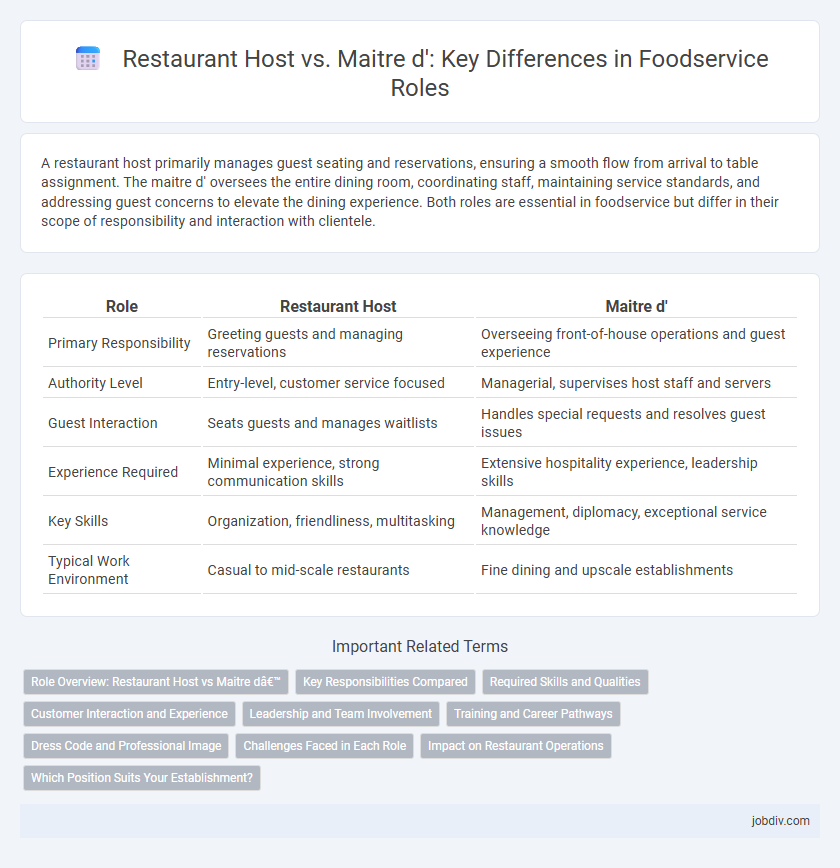A restaurant host primarily manages guest seating and reservations, ensuring a smooth flow from arrival to table assignment. The maitre d' oversees the entire dining room, coordinating staff, maintaining service standards, and addressing guest concerns to elevate the dining experience. Both roles are essential in foodservice but differ in their scope of responsibility and interaction with clientele.
Table of Comparison
| Role | Restaurant Host | Maitre d' |
|---|---|---|
| Primary Responsibility | Greeting guests and managing reservations | Overseeing front-of-house operations and guest experience |
| Authority Level | Entry-level, customer service focused | Managerial, supervises host staff and servers |
| Guest Interaction | Seats guests and manages waitlists | Handles special requests and resolves guest issues |
| Experience Required | Minimal experience, strong communication skills | Extensive hospitality experience, leadership skills |
| Key Skills | Organization, friendliness, multitasking | Management, diplomacy, exceptional service knowledge |
| Typical Work Environment | Casual to mid-scale restaurants | Fine dining and upscale establishments |
Role Overview: Restaurant Host vs Maitre d’
A restaurant host primarily manages guest seating and reservations, ensuring efficient table turnover and a welcoming atmosphere. The maitre d' oversees overall front-of-house operations, including supervising staff, managing reservations, and enhancing customer service standards. While both roles focus on guest experience, the maitre d' holds broader managerial responsibilities and strategic oversight within the dining environment.
Key Responsibilities Compared
A restaurant host primarily manages guest seating, reservations, and initial customer interactions to ensure smooth front-of-house operations. The maitre d' oversees the entire dining room, coordinating waitstaff, managing service flow, and maintaining high customer service standards throughout the meal experience. Key responsibilities of the maitre d' include supervising staff, addressing guest complaints, and ensuring overall guest satisfaction, while the host focuses on greeting guests and organizing seating logistics.
Required Skills and Qualities
A Restaurant Host requires strong interpersonal skills, excellent communication, and the ability to manage reservations efficiently, ensuring a smooth guest arrival experience. A Maitre d' must possess advanced leadership qualities, deep knowledge of fine dining etiquette, and the ability to oversee staff operations while maintaining high service standards. Both roles demand exceptional customer service skills, attention to detail, and the capability to handle guest concerns with professionalism.
Customer Interaction and Experience
A restaurant host primarily manages customer greetings and seating arrangements, ensuring efficient table turnover and a welcoming environment from the moment guests enter. The maitre d' oversees the overall dining experience, coordinating with waitstaff to deliver personalized service and promptly address guest needs or concerns. Both roles are crucial for maintaining smooth operations and enhancing customer satisfaction, but the maitre d' typically engages more deeply in optimizing the guest experience throughout the meal.
Leadership and Team Involvement
A restaurant host primarily manages guest seating and reservations, emphasizing smooth customer flow and initial impressions, while the maitre d' takes on a broader leadership role overseeing the entire dining room, including team coordination and service quality. The maitre d' leads staff meetings, resolves customer issues, and ensures staff collaboration, fostering a cohesive team environment that enhances overall dining experience. Strong leadership from the maitre d' drives team motivation and operational efficiency, whereas the host supports this by maintaining seamless front-of-house interactions.
Training and Career Pathways
A Restaurant Host typically undergoes on-the-job training focusing on customer service, reservation management, and seating coordination, serving as an entry-level position with opportunities to advance into supervisory roles. In contrast, a Maitre d' requires extensive hospitality training, often with certifications in service excellence and leadership, positioning them for higher managerial responsibilities within upscale dining establishments. Career pathways for a Restaurant Host commonly lead to roles such as front-of-house manager, while Maitre d' professionals may progress to restaurant manager or director of operations positions.
Dress Code and Professional Image
Restaurant hosts typically wear smart casual attire such as polo shirts and slacks, projecting a welcoming yet approachable professional image. Maitre d's often dress in formal uniforms or tailored suits, emphasizing sophistication and authority to align with upscale dining environments. The dress code for each role directly influences guest perceptions and sets the tone for the restaurant's ambiance.
Challenges Faced in Each Role
Restaurant hosts navigate challenges such as managing guest flow efficiently during peak hours and handling reservation conflicts to maintain a smooth dining experience. Maitre d' roles demand mastery in supervising service quality, resolving guest complaints diplomatically, and coordinating between kitchen and floor staff to ensure seamless operations. Both positions require exceptional communication skills and adaptability to fluctuating customer volumes and expectations.
Impact on Restaurant Operations
A restaurant host primarily manages guest seating and waitlists, directly influencing the flow of customers and table turnover rates, which are critical for maximizing revenue during peak hours. The maitre d' oversees overall dining room operations, coordinating between kitchen staff and servers to ensure seamless service and high guest satisfaction. Effective collaboration between both roles enhances operational efficiency, reduces wait times, and improves the dining experience, ultimately driving repeat business and positive reviews.
Which Position Suits Your Establishment?
A restaurant host primarily manages guest seating and reservation logistics, ensuring efficient table turnover and a welcoming first impression, ideal for fast-paced or casual dining establishments. In contrast, a maitre d' oversees the entire front-of-house operation, including staff coordination, guest relations, and service quality, making this role suitable for upscale or fine dining restaurants that require refined service management. Selecting between a host and a maitre d' depends on the restaurant's service style, size, and customer experience goals.
Restaurant Host vs Maitre d’ Infographic

 jobdiv.com
jobdiv.com